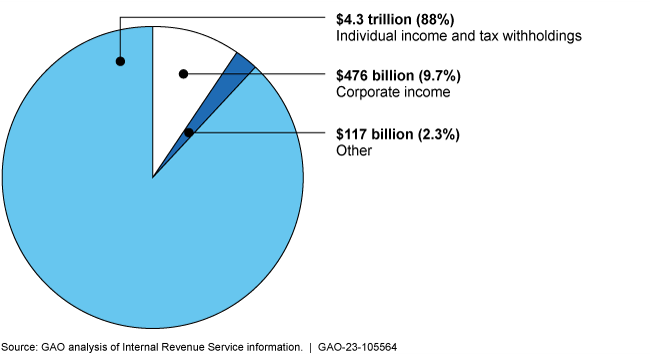Financial Audit: IRS's FY 2022 and FY 2021 Financial Statements
Fast Facts
The Internal Revenue Service collects taxes to fund federal programs and services.
In FY22, IRS collected over $4.9 trillion in taxes and paid out more than $600 billion in tax refunds, credits, and other payments.
We audit and issue opinions annually on IRS's financial statements and on related internal controls (e.g., processes to reasonably assure that transactions are properly authorized and recorded).
In FY22, we found the statements were reliable and that controls over financial reporting were effective—although some information system and unpaid assessments controls could be improved.
2022 IRS Collections of Federal Taxes, by Type

Highlights
What GAO Found
In GAO's opinion, the Internal Revenue Service's (IRS) fiscal years 2022 and 2021 financial statements are fairly presented in all material respects, and although internal controls could be improved, IRS maintained, in all material respects, effective internal control over financial reporting as of September 30, 2022. GAO's tests of IRS's compliance with selected provisions of applicable laws, regulations, contracts, and grant agreements disclosed no instances of reportable noncompliance in fiscal year 2022.
Limitations in the systems IRS uses to account for federal taxes receivable and other unpaid assessment balances, as well as other control deficiencies that led to errors in taxpayer accounts, continued to exist during fiscal year 2022. These control deficiencies affect IRS's ability to produce reliable financial statements without using significant compensating procedures. In addition, continuing information system security control deficiencies in such areas as encryption and configuration of security settings increase the risk of unauthorized access to, modification of, or disclosure of sensitive financial and taxpayer data and disruption of critical operations.
IRS continues to take steps to address deficiencies in its internal control over financial reporting. However, the remaining deficiencies are significant enough to merit the attention of those charged with governance of IRS and therefore represent continuing significant deficiencies in internal control over financial reporting related to (1) unpaid assessments and (2) financial reporting systems. Continued management attention is essential to fully addressing these significant deficiencies. In commenting on a draft of this report, IRS noted its intention to continue working to improve its internal controls.
Why GAO Did This Study
In connection with fulfilling GAO's requirement to audit the consolidated financial statements of the U.S. government, and consistent with its authority to audit statements and schedules prepared by executive agency components, GAO has audited IRS's financial statements because of the significance of IRS's tax collections to the consolidated financial statements of the U.S. government. GAO annually audits IRS's financial statements to determine whether (1) the financial statements are fairly presented and (2) IRS management maintained effective internal control over financial reporting. GAO also tests IRS's compliance with selected provisions of applicable laws, regulations, contracts, and grant agreements.
IRS's tax collection activities are significant to overall federal receipts, and the effectiveness of its financial management is of substantial interest to Congress and the nation's taxpayers.
For more information, contact Dawn B. Simpson at (202) 512-3406 or simpsondb@gao.gov.
